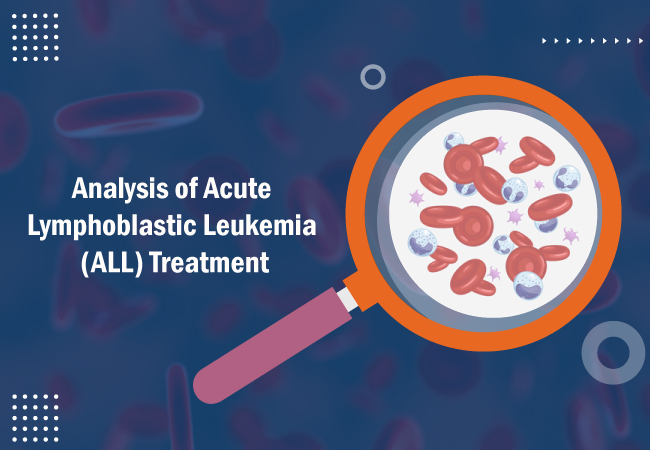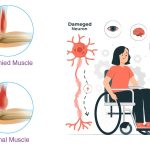KEY HIGHLIGHTS :
- Acute lymphoblastic leukemia can also be addressed as acute lymphocytic leukemia (ALL).
- ALL is a highly progressive blood cancer. In this disease, the bone marrow produces unnecessary immature lymphocytes known as lymphoblasts. This makes it tough for blood to function properly.
- Signs and symptoms of adult acute lymphoblastic leukemia include feeling tired, fever, and easy bruising or bleeding.
- Previous chemotherapy and exposure to radiation may be responsible for increasing the risk of developing the disease.
- Tests that examine the blood and bone marrow are used to diagnose adult acute lymphoblastic leukemia.
- To be diagnosed with this disease, 20% or beyond lymphoblasts must be available in the bone marrow. This simply means that at least two out of every ten marrow cells are lymphoblasts.
- There is more than one type of acute lymphoblastic leukemia (ALL). It is based on the type of lymphocyte, genetic mutations, and certain other features.
- Those with acute lymphoblastic leukemia should be treated at experienced cancer centers.
Acute Lymphoblastic Leukemia (ALL) and Its Treatment
Acute lymphoblastic leukemia is a highly progressive blood cancer that typically starts in disease-fighting lymphocytes of the immune system. In ALL, bone marrow creates excess immature lymphocytes named lymphoblasts. Lymphoblasts can disarrange other blood cells causing blood to not act as it should. Acute leukemias arise more quickly than chronic leukemias. The disease most typically affects B or T cells. ALL can be discovered in blood, bone marrow, and other organs such as the testicles or the central nervous system (CNS).
Treatment typically depends on the type of acute lymphoblastic leukemia, age at diagnosis, and certain other factors. ALL Treatments may include Chemotherapy, Steroids, Targeted therapy, Immunotherapy, Radiation therapy, and Stem cell transplant.
Chemotherapy:
Chemotherapy is the backbone of acute lymphoblastic leukemia (ALL) treatment and is often combined with certain other drug therapies. It is a kind of systemic drug therapy that kills quickly progressive cells throughout the body, including unhealthy cells and healthy cells. Chemotherapy can be given as follows:
- Oral (PO): taken orally either as a liquid or pill
- Subcutaneous (SQ): given under the skin
- Intramuscular (IM): uses a needle to inject the drug into the muscle of the arm or leg (like the flu shot)
- IV (intravenous) infusion: chemotherapy given through a vein using IV push, gravity infusion, or infusion pump.
- Intrathecal (IT): chemotherapy is given into the spinal fluid. In addition to other forms of chemo, it can be injected into the cerebrospinal fluid (CSF) to demolish any leukemia cells that might have progressed to the spinal cord and brain. This kind of treatment is administered through a spinal tap or lumbar puncture.
Types of Chemotherapy: Chemotherapies used for the treatment of Acute lymphoblastic leukemia (ALL) disrupt the life cycle of unhealthy (cancer) cells. There are several types of chemotherapy used to treat the disease (ALL). Typically chemotherapies are combined. This is known as multiagent chemotherapy. Some types of chemotherapies used for the treatment of ALL are mentioned next.
Alkylating agents: Alkylating agents are used to damage DNA by adding a chemical to it. This group of medicinal products includes cyclophosphamide.
Anthracyclines: Anthracyclines are used to damage and disrupt the creation of DNA causing cell death of both unhealthy and healthy cells. Some anthracyclines include:
- Nelarabine (Arranon)
- Fludarabine (Fludara)
- Clofarabine (Clolar)
- 6-MP (6-mercaptopurine)
- Cytarabine (Cytosar-U)
- Methotrexate
- Prednisone
- Hydrocortisone
- Dexamethasone
- Imatinib (Gleevec)
- Dasatinib (Sprycel)
- Nilotinib (Tasigna)
- Ponatinib (Iclusig)
- Bosutinib (Bosulif)
- The medicine Inotuzumab ozogamicin (Besponsa) binds to CD22 on leukemia cells and then releases a toxic agent once it’s inside the cells.
- Rituximab (Rituxan) acts against the protein CD20 found on the B cell’s surface. When it binds to this protein it triggers the death of cells.
- Blinatumomab (Blincyto) allows healthy T-cells to attack unhealthy B cells by bringing them close together. It mainly targets the CD19 antigen that exists in B cells. Blinatumomab may be responsible for causing severe, life-threatening, or fatal reactions. This medicinal product comes in the form of injection: 35 mcg of lyophilized powder in a single-dose vial for reconstitution. The proposed dosage of Blincyto 35 mcg injection should be administered intravenously.
- Individuals with leukemia in the central nervous system (CNS) at diagnosis may receive radiation to their brain area.
- Individuals with the testicular disease at diagnosis that remains after induction therapy may receive radiation therapy to the testes.
- Autologous: stem cells typically come from you
- Allogeneic: stem cells typically come from a donor who may or may not be related to you






